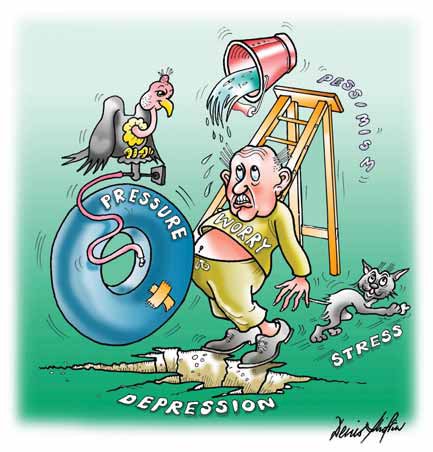
Illustration by Denis Shifrin.
By any standards, things aren't so good. The global financial crisis is worsening and will affect just about everybody one way or another. The prospects for a stable, progressive government in Israel are not encouraging. Israel's image abroad has reached a new low. Anti-Semitism in Europe, in the guise of legitimate criticism of Israel, has become overt and widespread. Iran and others hostile to us are becoming stronger. Some of our young people are becoming increasingly disillusioned with the Zionist enterprise and are opting out of their obligations or seeking greener pastures.
In times like these there is a danger that chronic worry over how things are and what will be will cause stress, with all the characteristic symptoms such as insomnia, lack of appetite, heartburn, hypochondria, high blood pressure, depression and the like. Stress is miserable, and is something that needs to be avoided like the plague, especially for those of us who are getting on in years and for those with pre-existing medical conditions that are likely to be aggravated thereby.
Of course one can take medication for treatment of the symptoms, but what is needed is a formula for the avoidance of stress. And since stress is a creation of the mind rather than the body, it is a question of training the mind.
For starters, it is manifestly non-productive to worry about things that we cannot change. We, the victims of global influences, have about as much ability to impact on those influences as we have to flap our arms and fly. So it is a complete waste of mental energy to worry about how, for example, the value of our pension funds may have declined.
Secondly, rather than worry about what we cannot do, we need to think about what we can do, and then do it. If after doing the necessary research we discover that there is a way to reduce our exposure to outside influences, we should act according to our best judgment. Then if our judgment turns out to be faulty and a course of action undertaken proves ineffective, this is not a reason for giving up but rather an incentive to choose a different path and try again.
Thirdly, if we conclude that there are things that we cannot possibly change in any way, no matter what we do and how hard we try, then the thing to do is to accept our limitations and live happily, or at least contentedly, with the reality. For some people, this is where it gets difficult; at times things can seem so bad and so hopeless that they may succumb to pessimism, be miserable, and in extreme cases take perverse pleasure in their status as victims. I think that being happy and optimistic or being miserable and pessimistic is a matter of choice. People need to believe that there actually is a silver lining behind every cloud and that nothing in this world condemns them to be eternally miserable.
There are just two realistic options: make changes or choose to accept things the way they are. In both cases there is no profit in getting stressed but a great deal to be gained by remaining optimistic and hopeful.
Let’s take a few examples.
Instead of worrying incessantly about the possibility of losing your job, work harder. Do the maximum to impress your superiors that you are a valuable asset worth retaining through this difficult period.
If you are already out of work, see this is an opportunity to start a new page of your life. Believe in yourself and your ability to adapt, to find alternative employment, to move to another area if necessary and to be flexible in your requirements. The alternative is to accept the situation, and try your hand at doing something as an independent.
Instead of moaning about the inadequacies of this or that politician or political party, get active. Join with others who think the way you do, and promote your ideas to as many people as you can. The alternative is to do absolutely nothing, stop worrying, accept whatever the electorate has decreed will be our fate, and go with the flow.
Israel’s image abroad, anti-Semitism, and disillusioned youth are things that we can all do something about…if we care enough. Be informed about all the arguments and counter-arguments, and use every opportunity to speak to people and to make the case for what you think is right. If every citizen took the trouble to understand the facts and undertook to be an ambassador for Israel and Zionism whenever and wherever, we could manage with a greatly downsized Ministry of Foreign Affairs. On the other hand, if you don’t care enough to do something about it, then why worry about it?
Worrying about what will probably never happen, according to the odds, is particularly non-productive. Do whatever you think you can to alert your son or daughter about the dangers on the road, and then assume when they get into their car that they will arrive safely at their destination. If, against the odds, something bad happens, then you are just going to have to deal with it, but expending all that energy worrying about what might be can be debilitating.
If the prospect of Iran possessing nuclear weaponry worries you, this is the least justifiable of worries. There is absolutely nothing you can do about it. You can’t prevent it and you can’t avoid it. You are much better off believing that if they have it they won’t use it, as was the case during the ‘Cold War’. If you are right, then there is nothing to worry about it, and if you are wrong….well….there is nothing…
For a lot of people, the most worrisome issue is their health. Here again, it is just a question of perspective. We are all mortal and our best hope is to reach an advanced age free of pain and maintain some quality of life. Worrying about the end of life and how to manage along the way is just about the worst thing we can do; stress is a known contributor to all kinds of nasty terminal diseases. There are better ways to get there; eating right, exercise in moderation, curbing bad habits, and taking enjoyment from every day of pain-free living. And when we are faced with the inevitable, we should do so without regret, counting the blessings we have enjoyed and reflecting on what we have managed to contribute to the lives of others.
As far as the health of our loved ones is concerned, worrying about them should be replaced by making sure that we have done everything we possibly can to help them. Then, if the fates are unkind, we can be content in the knowledge that we have done our very best and this will make living with a difficult reality a lot easier.
There you have it. I am no doctor and no psychoanalyst. But I am certain that we can all benefit if we just make the conscious decision: “I am not going to worry. Instead I am going to do the best I possibly can to make things better for myself and for others. What I can change, I will, and what I cannot change, I will live with.”
 Visit to Michmoret Research Center - Gifted Children's Project
Visit to Michmoret Research Center - Gifted Children's Project Esra Kfar Saba Meets Our New Deputy Mayor
Esra Kfar Saba Meets Our New Deputy Mayor Another glorious evening with pianist Gil Shochat
Another glorious evening with pianist Gil Shochat Yad Sarah's new house in Raanana
Yad Sarah's new house in Raanana English speaking Feldenkreis
English speaking Feldenkreis Men don't Make Passes at Girls who Wear Glasses
Men don't Make Passes at Girls who Wear Glasses Ilan Shachar
Ilan Shachar